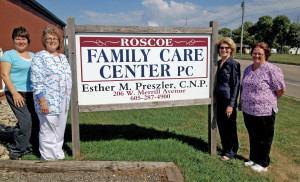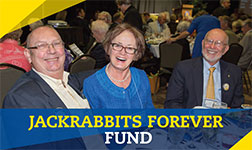Esther Preszler blends caring, compassion, entrepreneurship in her own clinic
Esther (Masat) Preszler pioneered nurse-owned and operated health clinics in South Dakota more than a decade ago, but it’s not a trail others are blazing with her.
When the SDSU grad opened Family Care Center in Roscoe June 2, 2004, she was charting new territory. No other nurse had approached the South Dakota Board of Nursing with such a question. Three others would follow her in the next couple of years. They’re in Mitchell, Rapid City and Sioux Falls.

The staff of Family Care Center in Roscoe, from left, business manager Gail Scherbenski, registered nurse Dee Bauman, family nurse practitioner Esther Preszler ’88/MS ’95, and registered nurse Kari Malfam.
The only one in a rural area—and you can’t get much more rural in East River than Roscoe—is Preszler’s Family Care Center.
Roscoe, population 324, is 40 miles west of a hospital or a movie theater. It’s smack in the middle of Edmunds County in north-central South Dakota. Fifteen minutes in any direction only leads to another herd of cattle or grain fields.
“I could make a lot more money in Sioux Falls or Brookings, but that’s not my desire,†Preszler said.
Her desire is to serve the community where she has lived since marrying farmer Greg Preszler in November 1994. At the time she was working as a perinatal clinical specialist at Avera St. Luke’s Hospital in Aberdeen, a city of 25,000 straight east of Roscoe.
Following a vision
That could have turned into a long-term career had there not been the winter of 1996-97. During that year of record snowstorms, the then-Highway 12 commuter made a health assessment of her own county, decided needs weren’t being met, and that she was going to do something about it.
“Ever since I was pursuing my master’s degree, I had a vision of a nurse-operated, nurse-owned clinic,†Preszler said.
It was time to do something about it, but as a clinical nurse specialist in perinatal she couldn’t write prescriptions or provide care to the entire family. That meant renewing her relationship with SDSU, where she had earned her bachelor’s (1988) and master’s (1995) degrees.
Preszler left her job in Aberdeen and spent 1997-98 completing the work required to become a family nurse practitioner. As planned, after finishing the schooling, she began work at a clinic in Bowdle, 15 miles west of Roscoe. There she learned what shapes small-town medical care.
A divine directive
“You just learn the dynamics, the [family] names, and that everybody is related to everybody,†Preszler said.
She also learned that the dynamics of that clinic weren’t right for her. During a spring in which her husband broke his hip, her stepson was diagnosed with cancer, and she struggled in the relationships in Bowdle, Preszler said she felt God tap her on the shoulder and say, “Esther, you need a change in your life.â€
God didn’t have to repeat himself. With her husband’s support and no other job in hand, Preszler quit her position at Bowdle.
That fall (2002) she agreed to do fill-in work at Hoven, 36 miles away, “but only a few days a week because my plan is to open my own clinic.†Hoven clinic administrators backed her vision. “‘We’ll help you any way we can,’†she was told, recalled Preszler.
Patients treated like family
It took six months from the time she signed the articles of incorporation for the clinic until the doors opened.
This June, the clinic—Preszler, a business manager and two registered nurses—marked the 10-year anniversary with a three-day open house. For Preszler and her staff, who have been a team for most of those 10 years, the celebrations are a daily observation.
In those 10 years, she has had more than 1,700 patients, though she wouldn’t consider many of them patients.
“I’m going to treat everybody like they’re my husband, my son or my parents.â€
Among those she has been treating for 10 years is Pam Garner, 64, who lives right across the street from the clinic. “My main thing with her is she takes the time with you and encourages you to ask questions. She’s not afraid to send you on if she’s not sure what’s going on.â€
Garner has been referred to Aberdeen for gall bladder and knee replacement surgeries, but she always starts with Preszler because of the trust.
While the patients’ charts have numbers, the patients don’t.
“Her whole crew over there is very, very friendly. If I call and really need to see her quick, they will work us in,†said Garner, whose husband manages the Adee Honey Farm facility in Roscoe. After an office visit, it’s not unusual to receive an evening follow-up call “making sure we’re OK.â€
Can-do attitude overcomes obstacles
Nancy Fahrenwald, dean of the SDSU College of Nursing, said Preszler “embodies the pioneering spirit, passion and commitment that is needed to meet rural primary health-care needs. Her story of establishing a clinic in Roscoe is admirable.â€
She has known Preszler for 30 years, but hadn’t visited her clinic until making an August trip to Roscoe.
“I thought it was important to see the physical space and get to know her team. I have always admired her can-do attitude and the confidence in her nursing role, whether it be as a perinatal clinical nurse specialist in prior service, or as a family nurse practitioner.
“What Esther is doing is overcoming obstacles to providing health care to people who need it,†Fahrenwald said.
‘Thankful every day’
Preszler has been practicing nursing since 1973, when she earned an associate degree from Presentation College in Aberdeen.
Now 62, some of her classmates are finalizing retirement plans. How much longer before Preszler sets aside her medical mission?
“I’ve asked myself that exact same question. (But) I love what I’m doing. This morning as I was getting ready to for work I thought, ‘I need people, I meet with people; I love providing a service to the community and I know we’re doing good.
“God has given us the strength to do that and I’m thankful every day,†Preszler said, answering her own question.
Bumps along the road
But Preszler doesn’t mistake Roscoe for Nirvana or rural South Dakota for Utopia. There are challenges in Roscoe and at Family Care Center.
“We’re all feeling change with what’s happening with reimbursement issues and demographic issues,†she said, switching hats from the practicing nurse to the clinic owner.
A nursing home in nearby Hosmer closed 1 ½ years ago. An assisted living center in Roscoe with eight residents closed two years ago. “When you lose 30 visits a month, where do you market to get those additional visits?†Preszler asked.
The loss of that elderly clientele meant that Medicare’s share of the clinic’s income has dropped from 43 to 31 percent.
“As our population is aging, we’re seeing more of our elderly seniors moving to communities where there are greater resources, like assisted living or nursing homes. We don’t have meals on wheels and skilled in-home nursing care†in Roscoe, Preszler said.
Signs of community life
But the town isn’t drying up.
She points to an increased workforce thanks to Global Harvest, a birdseed packager; Wheat Growers grain cooperative and a successful John Deere dealership. “We’ve had some new families move in, which has been wonderful,†Preszler said.
Healthy, young families are the foundation for a growing community, but they don’t bring the same demand for medical services that their emigrating grandparents did.
“You have to continually do community assessment. You can’t just bury your head and say this is the way we’ve always done that,†Preszler said.
Hampered by federal regulations
Decreasing Medicare reimbursement rates, which Preszler said moved the Hosmer and Roscoe facilities to closing, also affects her clinic as does the penalty for not having electronic medical records.
“We’re getting knocked 2 percent off our reimbursement rate because we don’t have it,†Preszler said.
She said she would like to use electronic medical records and it would save her time, but “2 percent of our reimbursement rate is going to take a long time to pay the upfront cost, and it would do nothing to help my patients†because health systems can’t read records outside their own system.
“We’re kind of at a crux with a lot of issues with health care with the mandates.â€
She added, “You have to look at the bottom dollar and make sure the payroll is met, the bills are paid. (But) a lot of times it’s a community service. For example, if someone goes to Aberdeen for an appointment and they need a blood draw locally, the Medicare reimbursement is $2.74 for a lab draw.
“It’s very rare that we actually sit down and run some of these numbers because it doesn’t matter. It’s about the relationships. It’s about the people. It’s about taking care of our neighbors.â€
 Dave Graves






